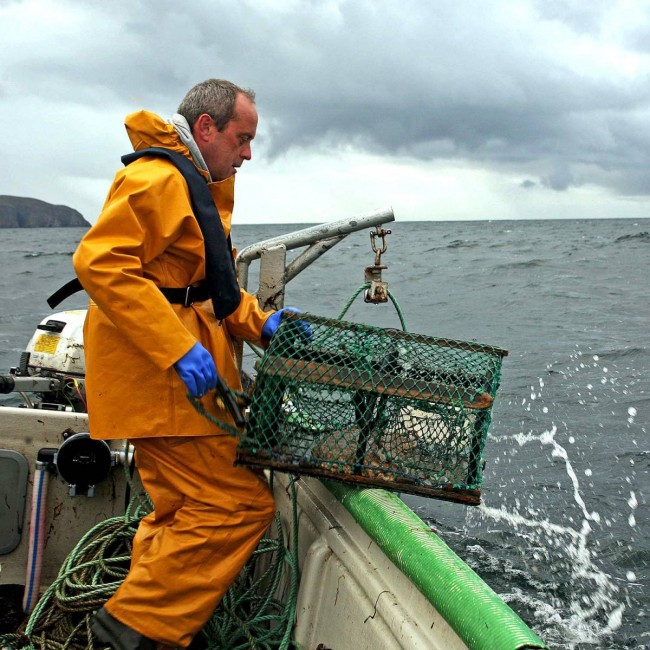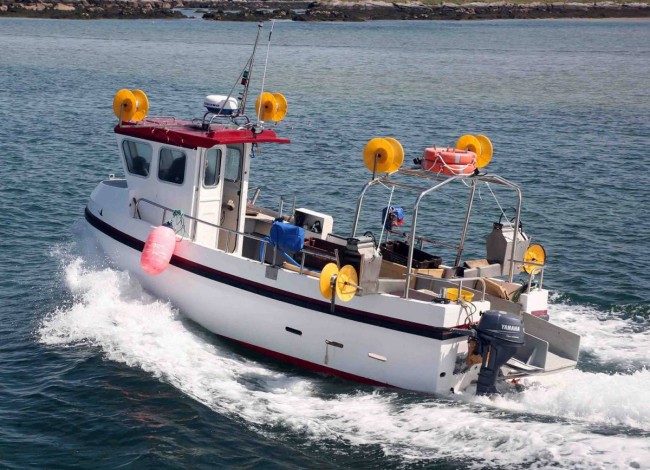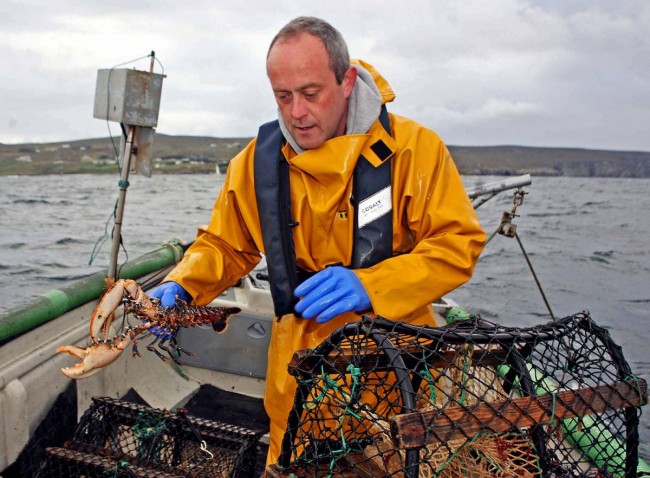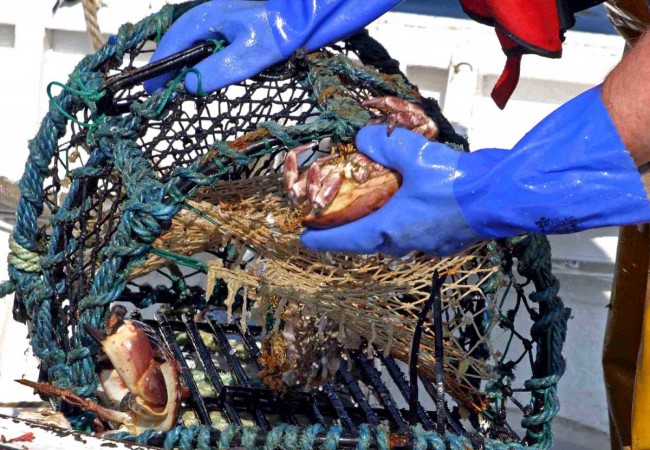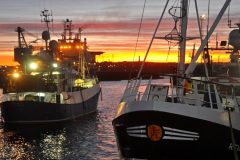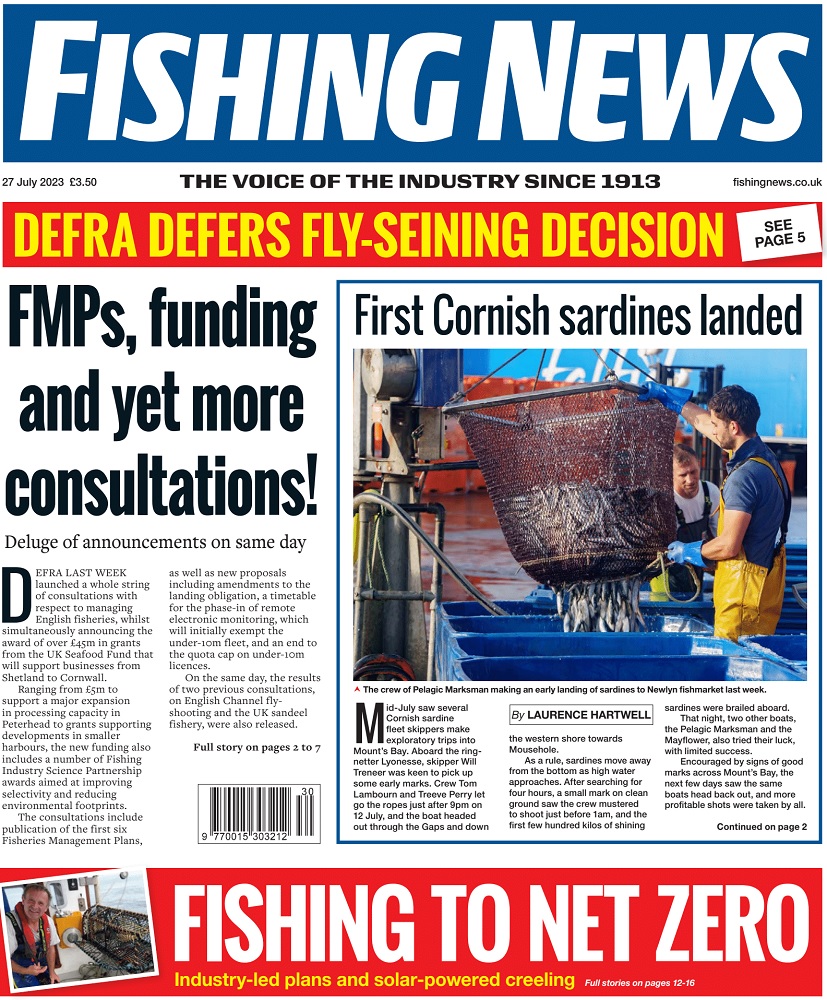In his role as the National Inshore Fisheries Forum’s (NIFF) new chairman, Alex Crowley enjoyed a very short honeymoon period to settle in. As a full-time fisherman totally dependent on fishing for a living, Alex understands better than most the need for proper inshore management to make it sustainable for the future, reports Pauric Gallagher
Above: NIFF chairman Alex Crowley onboard his vessel Emma Lou.
Being tasked with the job of chairman of the NIFF must rank as one of the most challenging posts of all. Given the complex nature of the inshore sector, and recognising the need to make the correct decisions on key issues at this critical junction of opportunity for its fishermen, is the driving factor for the Forum’s new chairman.
In an exclusive interview with Fishing News, Alex Crowley set the scene for what he hopes will be a productive and positive term as NIFF’s Chairman. He also gave his opinion in response to questions relating to the setting-up of NIFF to tackle the many problems facing the inshore sector, and discussed what the Forum has achieved in its first year.
Alex Crowley said: “Firstly it’s not just the NIFF that was set up, there are also six Regional Inshore Fisheries Forums (RIFF) that contain 72 representatives – the NIFF consists of just 12 representatives, two from each RIFF.
“In my opinion, the Forums were set up to give a national voice to the inshore sector, and to put that voice on a platform from where it can be heard. They were formed to provide a means of two-way communication between the state and the inshore sector. Has this been achieved? I would like to think that it has.
“Since its inception, the NIFF has had five high-level meetings with senior Department of Agriculture, Food and Marine (DAFM) officials, and senior officials from Bord Iascaigh Mhara (BIM), Marine Institute (MI) and Sea Fisheries Protection Authority (SFPA). Minister Simon Coveney attended and engaged in four of those meetings.
“We are hoping to expand this further, where the NIFF engages with other governmental departments and their relevant agencies. The RIFFs have also, in their own right, engaged with DAFM and the agencies on a number of relevant regional issues. I would like to think that, in our first year, this is a considerable level of engagement and is somewhat on a par with what other representative bodies for different sectors have achieved.”
Fishing News: So what has actually been achieved with all this engagement?
Alex Crowley: “To be honest, I would like to give you a big long list here, but if we have learned anything in the past year, it’s that wins are hard-earned in this business! To a certain extent this is understandable, because when you delve into the more important issues facing the inshore sector, it becomes apparent how complex they are, and that there won’t be any quick-fixes for many of the EU regulations issues. We need to be realistic here, but that doesn’t mean we won’t stop trying.
“There have been a few little things I’d like to think we can claim some credit for; I understand that the Maximum Landing Size (MLS) regulation of 127mm for lobsters will be reviewed in 2016. I’d like to think that pressure applied through the Forums played a significant part in bringing this review about.
“I’d also like to think that the Forums played a part in achieving an increase in funding for V-notching, to help mitigate the economic cost of the regulation. I also hope an announcement will be made in the not too distant future regarding restrictions on non-commercial potting, something that the Forums again played a part in bringing about, but I’d like to reserve further comment on this issue until an announcement is made.
“The NIFF made a detailed submission on the draft Seafood Development Programme (SDP) under the consultation process. I would like to think that our submission has played a little role in securing an increase in funding for the inshore sector under this Operational Programme.
“The Regional Forums have also achieved a few things, for example, the South West RIFF played a part in opening a line of communication between local fishermen and the film production company during the filming of Star Wars on the Skelligs this year.”
Fishing News: Some individuals have been highly critical of how the Forums were set up using Fisheries Local Action Groups (FLAGs) to select the people involved. Some of whom have no commercial inshore fishing experience, suggesting that the Forums will never represent fishermen, as they are compromised by the sectors they come from. They say that the inshore sector needs representation from bona fide inshore fishermen, how do you view this?
Alex Crowley: “All I can say is, can you think of a better method that would have worked, in a timely manner, considering how disorganised and fragmented the inshore sector was?
“I don’t think an election process would have been possible, and applicants to the FLAGs had to demonstrate a level of support from the local industry during the selection process anyway. Our Terms of Reference also clearly state that the makeup of the Regional Forums must consist of at least two-thirds of the representatives being from the inshore fisheries sector.
“Having people from different backgrounds adds an interesting dynamic to the Forums, which can be useful when dealing with more complex issues. It also presents us with people that have a wide range of skill sets – something, I feel, we should take full advantage of.
“Perhaps the inshore sector would be better served by a stand-alone, self-funded national representative organisation. This is something that has been tried on several occasions, with the best of intentions, but never seemed to take off. Who knows? Maybe in time, it’s something that may develop out of the Forums.”
Fishing News: Do you, like a number of others, consider the Terms of Reference of the Forums too restrictive?
Alex Crowley: “If you examine the Terms of Reference closely, I think you will find that they are quite loose and not restrictive at all. I think they were left that way deliberately, to allow the Forums to develop as necessary. Actually, I feel that if they were a little more restrictive at the beginning it might have helped us focus better to begin with, but that’s just my opinion!
“I’d like to think that the Terms of Reference can be adapted to suit the needs of the inshore sector. For example, under the scope of the Forums, our Terms of Reference prohibits us from spending time on social protection policy, but understandably this is something that has repeatedly come up through the Regional Forums. As a result, I am hoping that the NIFF will meet with officials from the Department of Social Protection in January 2016. This meeting is being organised and facilitated, like all our other meetings, by DAFM and BIM. If this isn’t an indication that our Terms of Reference can be altered, then I don’t know what is. It’s also a clear indication of DAFM’s, BIM’s and Minister Coveney’s support for the Forums and its development in catering for the needs of the inshore sector.”
Fishing News: There have been suggestions that people are only involved to push their own agendas while on the Forums, that some are there for financial gain and that it’s just ‘jobs for the boys’?
Alex Crowley: “Firstly, we have a strict policy in place to prevent individual agendas being discussed at national level. Agenda items for NIFF meetings must come from meetings of the Regional Forums, at least three weeks in advance of a NIFF meeting. If an individual raises an issue at a RIFF meeting, to further progress it, it needs to be discussed with, and approved by, his or her peers on the Regional Forum. If the individual is successful then I guess it’s no longer an individual’s issue, and more than likely an issue that affects the wider industry.
“Secondly, regarding Forum members participating for financial gain, the truth of the matter is that we get basic travelling and subsistence expenses for attending meetings, and rightfully so. There is also a labour replacement cost of €200 per meeting attended, of which RIFF members are limited to five per year. NIFF members have a higher attendance limit as they have to attend more meetings, but payment is always subject to pre-approval by BIM, and all claims are subject to scrutiny from BIM.
“There is a considerable amount of work between meetings, and preparatory work before them. For example, since the inception of the Forums, one Forum member working for the inshore sector attended 27 meetings in less than a year. For some of these meetings, no compensation whatsoever was sought, or received, by this member.
“For me personally, a trip to a NIFF meeting typically involves a 4am start and not getting home until as late as 11pm. Like most of my colleagues, I try to avoid overnight trips if possible, as we have other lives to lead and livings to make. Having said that, I have it relatively easy, as two members of NIFF hail from islands off the western seaboard and attending a meeting can entail a campaign of a couple of days for them.
“I guess the point I’m trying to make is that to say we are handsomely or over-generously compensated for our time is a bit of a stretch of the imagination.”
Fishing News: Critics say that no one knows what is discussed or what goes on at both NIFF or RIFF meetings and that Minutes need to be made public, also that there isn’t enough feedback to ordinary fishermen who are not part of the Forum. What do you think of this?
Alex Crowley: “I agree, there is room for improvement here but you have to realise that the Forum members work in a voluntary capacity and that given the amount of work involved, as outlined in the previous question, it’s not possible to go around and tell everyone in the sector what’s going on. I am hoping that we will have a website up and running shortly, which should help with this. I feel that the public need to know what happens at meetings, but we also need to find a balance that allows for free expression at our meetings. If Forum members feel that what they say will be quoted verbatim then I fear our meetings will be short and silent, which won’t be very productive either.”
Fishing News: Some have also suggested that fishermen on the ground cannot put their views into the Regional Forums?
Alex Crowley: “Again, I agree that there is need for improvement here. So far, this is being done in an ad hoc manner, either to the RIFF secretaries (BIM’s Inshore staff) or directly to members of the Regional Forums. This can be time-consuming for Forum members and a little awkward for some fishermen. We are currently considering more formal, transparent methods to help with this, such as setting-up a dedicated email address to handle submissions to the relevant Regional Forum. In the interim, this shouldn’t put people off engaging with their Regional Forum, it’s something we all actively encourage. If fishermen want the Forums to work for them, then they will have to work with us.”
Fishing News: Although the setting-up of the NIFF is very much in line with the new Common Fisheries Policy, where small-scale fisheries are recognised as being a critical part of the socio-economic development within coastal communities, some critics have suggested that this is just something the state has done in order to draw down EMFF money. What do you think?
Alex Crowley: “Yes, the establishment of the forums may be in line with the new CFP, but I think it goes above and beyond any requirements for public consultation with the small-scale coastal fleet. To be brutally honest, there was a time when I myself was, to some extent, one of these critics. However, having studied the new CFP, the EMFF regulation, the draft SDP and the revised Operating Programme as submitted in October this year, and as a member of the SDP monitoring committee, I no longer believe that this is the case. In any respect, is the state endeavouring to draw down EMFF money necessarily a bad thing, especially when some of that money will find its way to the inshore sector?”
During the course of the interview with Fishing News, it was apparent that NIFF’s new chairman is keen to combine his extensive knowledge of the inshore sector with what is now available to the Forum from other organisations. And for the inshore fisherman, NIFF is the only coherent voice with the potential to deliver management and consistency to their sector, while keeping it sustainable well into the future.
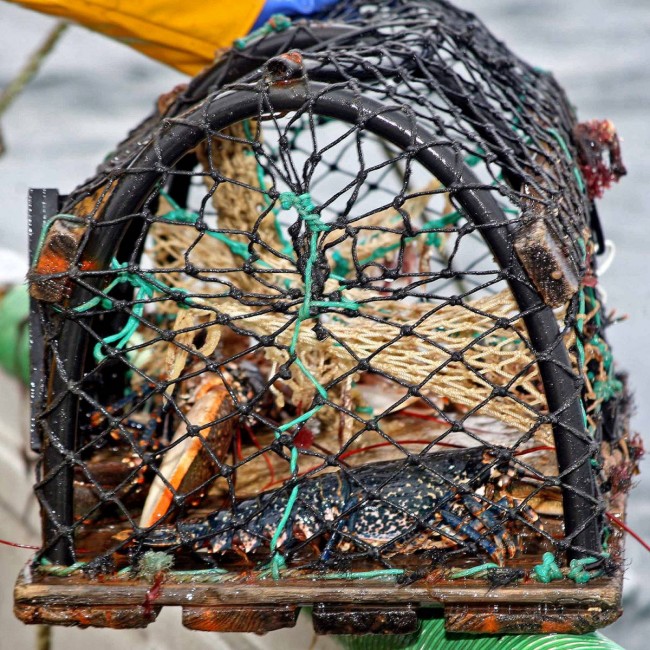
The Maximum Landing Size regulation of 127mm for lobsters will be reviewed in 2016 as a result of the Forums.
Read more from Fishing News here.


In his role as the National Inshore Fisheries Forum’s (NIFF) new chairman, Alex Crowley enjoyed a very short honeymoon period to settle in. As a full-time fisherman totally dependent on fishing for a living, Alex understands better than most the need for proper inshore management to make it sustainable for the future, reports Pauric Gallagher
Above: NIFF chairman Alex Crowley onboard his vessel Emma Lou.
Being tasked with the job of chairman of the NIFF must rank as one of the most challenging posts of all. Given the complex nature of the inshore sector, and recognising the need to make the correct decisions on key issues at this critical junction of opportunity for its fishermen, is the driving factor for the Forum’s new chairman.
In an exclusive interview with Fishing News, Alex Crowley set the scene for what he hopes will be a productive and positive term as NIFF’s Chairman. He also gave his opinion in response to questions relating to the setting-up of NIFF to tackle the many problems facing the inshore sector, and discussed what the Forum has achieved in its first year.
Alex Crowley said: “Firstly it’s not just the NIFF that was set up, there are also six Regional Inshore Fisheries Forums (RIFF) that contain 72 representatives – the NIFF consists of just 12 representatives, two from each RIFF.
“In my opinion, the Forums were set up to give a national voice to the inshore sector, and to put that voice on a platform from where it can be heard. They were formed to provide a means of two-way communication between the state and the inshore sector. Has this been achieved? I would like to think that it has.
“Since its inception, the NIFF has had five high-level meetings with senior Department of Agriculture, Food and Marine (DAFM) officials, and senior officials from Bord Iascaigh Mhara (BIM), Marine Institute (MI) and Sea Fisheries Protection Authority (SFPA). Minister Simon Coveney attended and engaged in four of those meetings.
“We are hoping to expand this further, where the NIFF engages with other governmental departments and their relevant agencies. The RIFFs have also, in their own right, engaged with DAFM and the agencies on a number of relevant regional issues. I would like to think that, in our first year, this is a considerable level of engagement and is somewhat on a par with what other representative bodies for different sectors have achieved.”
Fishing News: So what has actually been achieved with all this engagement?
Alex Crowley: “To be honest, I would like to give you a big long list here, but if we have learned anything in the past year, it’s that wins are hard-earned in this business! To a certain extent this is understandable, because when you delve into the more important issues facing the inshore sector, it becomes apparent how complex they are, and that there won’t be any quick-fixes for many of the EU regulations issues. We need to be realistic here, but that doesn’t mean we won’t stop trying.
“There have been a few little things I’d like to think we can claim some credit for; I understand that the Maximum Landing Size (MLS) regulation of 127mm for lobsters will be reviewed in 2016. I’d like to think that pressure applied through the Forums played a significant part in bringing this review about.
“I’d also like to think that the Forums played a part in achieving an increase in funding for V-notching, to help mitigate the economic cost of the regulation. I also hope an announcement will be made in the not too distant future regarding restrictions on non-commercial potting, something that the Forums again played a part in bringing about, but I’d like to reserve further comment on this issue until an announcement is made.
“The NIFF made a detailed submission on the draft Seafood Development Programme (SDP) under the consultation process. I would like to think that our submission has played a little role in securing an increase in funding for the inshore sector under this Operational Programme.
“The Regional Forums have also achieved a few things, for example, the South West RIFF played a part in opening a line of communication between local fishermen and the film production company during the filming of Star Wars on the Skelligs this year.”
Fishing News: Some individuals have been highly critical of how the Forums were set up using Fisheries Local Action Groups (FLAGs) to select the people involved. Some of whom have no commercial inshore fishing experience, suggesting that the Forums will never represent fishermen, as they are compromised by the sectors they come from. They say that the inshore sector needs representation from bona fide inshore fishermen, how do you view this?
Alex Crowley: “All I can say is, can you think of a better method that would have worked, in a timely manner, considering how disorganised and fragmented the inshore sector was?
“I don’t think an election process would have been possible, and applicants to the FLAGs had to demonstrate a level of support from the local industry during the selection process anyway. Our Terms of Reference also clearly state that the makeup of the Regional Forums must consist of at least two-thirds of the representatives being from the inshore fisheries sector.
“Having people from different backgrounds adds an interesting dynamic to the Forums, which can be useful when dealing with more complex issues. It also presents us with people that have a wide range of skill sets – something, I feel, we should take full advantage of.
“Perhaps the inshore sector would be better served by a stand-alone, self-funded national representative organisation. This is something that has been tried on several occasions, with the best of intentions, but never seemed to take off. Who knows? Maybe in time, it’s something that may develop out of the Forums.”
Fishing News: Do you, like a number of others, consider the Terms of Reference of the Forums too restrictive?
Alex Crowley: “If you examine the Terms of Reference closely, I think you will find that they are quite loose and not restrictive at all. I think they were left that way deliberately, to allow the Forums to develop as necessary. Actually, I feel that if they were a little more restrictive at the beginning it might have helped us focus better to begin with, but that’s just my opinion!
“I’d like to think that the Terms of Reference can be adapted to suit the needs of the inshore sector. For example, under the scope of the Forums, our Terms of Reference prohibits us from spending time on social protection policy, but understandably this is something that has repeatedly come up through the Regional Forums. As a result, I am hoping that the NIFF will meet with officials from the Department of Social Protection in January 2016. This meeting is being organised and facilitated, like all our other meetings, by DAFM and BIM. If this isn’t an indication that our Terms of Reference can be altered, then I don’t know what is. It’s also a clear indication of DAFM’s, BIM’s and Minister Coveney’s support for the Forums and its development in catering for the needs of the inshore sector.”
Fishing News: There have been suggestions that people are only involved to push their own agendas while on the Forums, that some are there for financial gain and that it’s just ‘jobs for the boys’?
Alex Crowley: “Firstly, we have a strict policy in place to prevent individual agendas being discussed at national level. Agenda items for NIFF meetings must come from meetings of the Regional Forums, at least three weeks in advance of a NIFF meeting. If an individual raises an issue at a RIFF meeting, to further progress it, it needs to be discussed with, and approved by, his or her peers on the Regional Forum. If the individual is successful then I guess it’s no longer an individual’s issue, and more than likely an issue that affects the wider industry.
“Secondly, regarding Forum members participating for financial gain, the truth of the matter is that we get basic travelling and subsistence expenses for attending meetings, and rightfully so. There is also a labour replacement cost of €200 per meeting attended, of which RIFF members are limited to five per year. NIFF members have a higher attendance limit as they have to attend more meetings, but payment is always subject to pre-approval by BIM, and all claims are subject to scrutiny from BIM.
“There is a considerable amount of work between meetings, and preparatory work before them. For example, since the inception of the Forums, one Forum member working for the inshore sector attended 27 meetings in less than a year. For some of these meetings, no compensation whatsoever was sought, or received, by this member.
“For me personally, a trip to a NIFF meeting typically involves a 4am start and not getting home until as late as 11pm. Like most of my colleagues, I try to avoid overnight trips if possible, as we have other lives to lead and livings to make. Having said that, I have it relatively easy, as two members of NIFF hail from islands off the western seaboard and attending a meeting can entail a campaign of a couple of days for them.
“I guess the point I’m trying to make is that to say we are handsomely or over-generously compensated for our time is a bit of a stretch of the imagination.”
Fishing News: Critics say that no one knows what is discussed or what goes on at both NIFF or RIFF meetings and that Minutes need to be made public, also that there isn’t enough feedback to ordinary fishermen who are not part of the Forum. What do you think of this?
Alex Crowley: “I agree, there is room for improvement here but you have to realise that the Forum members work in a voluntary capacity and that given the amount of work involved, as outlined in the previous question, it’s not possible to go around and tell everyone in the sector what’s going on. I am hoping that we will have a website up and running shortly, which should help with this. I feel that the public need to know what happens at meetings, but we also need to find a balance that allows for free expression at our meetings. If Forum members feel that what they say will be quoted verbatim then I fear our meetings will be short and silent, which won’t be very productive either.”
Fishing News: Some have also suggested that fishermen on the ground cannot put their views into the Regional Forums?
Alex Crowley: “Again, I agree that there is need for improvement here. So far, this is being done in an ad hoc manner, either to the RIFF secretaries (BIM’s Inshore staff) or directly to members of the Regional Forums. This can be time-consuming for Forum members and a little awkward for some fishermen. We are currently considering more formal, transparent methods to help with this, such as setting-up a dedicated email address to handle submissions to the relevant Regional Forum. In the interim, this shouldn’t put people off engaging with their Regional Forum, it’s something we all actively encourage. If fishermen want the Forums to work for them, then they will have to work with us.”
Fishing News: Although the setting-up of the NIFF is very much in line with the new Common Fisheries Policy, where small-scale fisheries are recognised as being a critical part of the socio-economic development within coastal communities, some critics have suggested that this is just something the state has done in order to draw down EMFF money. What do you think?
Alex Crowley: “Yes, the establishment of the forums may be in line with the new CFP, but I think it goes above and beyond any requirements for public consultation with the small-scale coastal fleet. To be brutally honest, there was a time when I myself was, to some extent, one of these critics. However, having studied the new CFP, the EMFF regulation, the draft SDP and the revised Operating Programme as submitted in October this year, and as a member of the SDP monitoring committee, I no longer believe that this is the case. In any respect, is the state endeavouring to draw down EMFF money necessarily a bad thing, especially when some of that money will find its way to the inshore sector?”
During the course of the interview with Fishing News, it was apparent that NIFF’s new chairman is keen to combine his extensive knowledge of the inshore sector with what is now available to the Forum from other organisations. And for the inshore fisherman, NIFF is the only coherent voice with the potential to deliver management and consistency to their sector, while keeping it sustainable well into the future.

The Maximum Landing Size regulation of 127mm for lobsters will be reviewed in 2016 as a result of the Forums.
Read more from Fishing News here.

